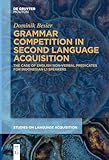Grammar Competition in Second Language Acquisition : The Case of English Non-Verbal Predicates for Indonesian L1 Speakers / Dominik Besier.
Material type: TextSeries: Studies on Language Acquisition [SOLA] ; 70Publisher: Berlin ; Boston : De Gruyter Mouton, [2023]Copyright date: ©2023Description: 1 online resource (VIII, 304 p.)Content type:
TextSeries: Studies on Language Acquisition [SOLA] ; 70Publisher: Berlin ; Boston : De Gruyter Mouton, [2023]Copyright date: ©2023Description: 1 online resource (VIII, 304 p.)Content type: - 9783110766257
- 9783110766370
- 9783110766332
- 425.6071 23/ger
- online - DeGruyter
- Issued also in print.
| Item type | Current library | Call number | URL | Status | Notes | Barcode | |
|---|---|---|---|---|---|---|---|
 eBook
eBook
|
Biblioteca "Angelicum" Pont. Univ. S.Tommaso d'Aquino Nuvola online | online - DeGruyter (Browse shelf(Opens below)) | Online access | Not for loan (Accesso limitato) | Accesso per gli utenti autorizzati / Access for authorized users | (dgr)9783110766332 |
Frontmatter -- Contents -- 1 Introduction -- 2 The theoretical framework -- 3 Generative description of Indonesian -- 4 Non-verbal predicates in English and Indonesian -- 5 The empirical study -- 6 Conclusion -- References -- Appendix -- Test 1 -- Test 2 -- Index
restricted access online access with authorization star
http://purl.org/coar/access_right/c_16ec
Anybody with the chance of teaching English to Indonesian speakers should have experienced difficulties when it comes to non-verbal predicates and the placement of be. This volume looks at this matter from a grammar competition perspective.An experiment conducted in Bandar Lampung with Indonesian learners of English identified specific error patterns. These patterns result from grammar competition between the L1 Indonesian and the L2 English. This work mainly deals with the influence of adverbs such as still or already, and the category of the non-verbal predicate (adjectival, nominal, preposition phrase).Although the main focus of this work is in the field of language acquisition, this volume also provides a detailed contrast between English and Indonesian non-verbal predicates and the contrast of the English copula be and the Indonesian copulas ada and adalah. The lingusitic description is done in a generative DM-based approach. Thus, this volume does not only provide new insights in the field language acquisiton, but also in the generative description of Indonesian in general and non-verbal predicates in particular.
Issued also in print.
Mode of access: Internet via World Wide Web.
In English.
Description based on online resource; title from PDF title page (publisher's Web site, viewed 25. Jun 2024)


